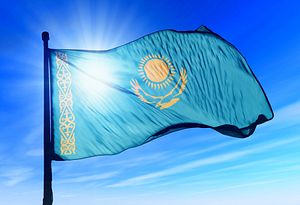While Astana’s plans to privatize swaths of unused land may make economic sense, local frustration about the pending auctions exposes tensions not often seen in public view in Kazakhstan. After a quarter-century of pushing a national unity narrative, kicked into higher gear with last year’s celebrations of 550 years of Kazakh statehood, it’s no surprise that citizens would get riled up about the idea of selling the homeland to foreigners. Whether that grievance is accurate or not is of little importance; people are angry at their government and have few methods of expressing that anger.
Over the weekend there were protests in several regions. RFE/RL reported unsanctioned “demonstrations against the proposed privatization of land in the major cities of the east (Astana and Almaty), in oil towns in the west (Atyrau and Aktau), in towns in the north (Aktobe and Semey), and in the south (Shymkent).” And on May 1 – National Unity Day – there were additional protests in Kyzylorda and Zhanaozen, the latter the site of protests which the state cracked down on in 2011, leaving 17 dead on Kazakhstan’s Independence Day.
Last week, I wrote up in brief the technicalities at the heart of the present issue:
The land code changes (which, if you were wondering, fall into the third of five structural reforms Kazakhstan plans on accomplishing with 100 Concrete Steps), would make unused land available for purchase by Kazakh citizens or joint ventures or for rent by foreigners for up to 25 years via land auctions. The proceeds would be directed into the National Fund, the state’s sovereign wealth fund built up over years from oil and gas revenues but now deflating due to economic stress.
The concept of land sales in Kazakhstan makes some economic sense even if it is an explosive issue politically. With oil and gas revenues sinking, Astana is hawking another resource that may be in demand: land. While the state is the world’s ninth-largest by area, with over 1.1 million square miles of territory, it is in the bottom rung of population density, with just 16 people per square mile.
The issue, for some, is rooted in the rumor that land would be sold outright to foreigners. For others, more realistic fears pushed them to the streets: the possibility that the best land would be purchased by Kazakhstan’s elites for cheap or by the Chinese. Given recent corruption scandals involving Kazakhstan’s elites, the first worry is legitimate. As Bruce Pannier at RFE/RL explained this would not be the first time land transfers and China angered Kazakh citizens. In the late 1990s, Kazakhstan celebrated the fact that it came away from border delimitation negotiations with China with 56.9 percent “of the disputed territory but critics pointed out that the remaining 43.1 percent had been Kazakhstan’s land until the new deal with China.”
Ceding land to China wasn’t popular then and even the idea of it happening is not popular now. This isn’t a unique grievance. Countries around the world have experienced tension with regard to the sale of public land or major infrastructure to foreign entities. Just last week the Australian government blocked the sale of farmland to a Chinese consortium for the second time in sixth months; and there have been several deals – particularly regarding ports – in the United States where foreign buyers aroused domestic ire (although government ownership of land, especially in the American West, also causes anger in some quarters).
While the timing might make sense to Astana – oil isn’t profitable to sell right now but land might be –Pannier is dead-on that Kazakhstan made a major misstep in not making it “crystal clear from the outset that foreigners, including Chinese, could not own any of Kazakhstan’s land.” For the past quarter-century, Astana has made clear efforts to define itself as an independent state and land has been a piece of that conversation. For example, the Kazakh constitution begins with a reference to “creating a state on the indigenous Kazakh land.”
Though the sale of land to foreigners is the fear of nationalists around the world, the problem in Kazakhstan has been further exacerbated by the fact that local media is reluctant to touch on the protests, and, before there were protests, reluctant to touch on controversial issues. The inability of Kazakhs to influence their government leaves them few options when it comes to expressing their discontent with specific policies. They have not, for example, had viable opposition politicians to vote for who presented alternate views on policy in any of the previous presidential elections, let alone the parliamentary elections earlier this year. The state conflates disagreement on policy matters as disunity or even possibly disloyalty. Thus, in response to protests, President Nursultan Nazarbayev has pointed fingers as unnamed “provocateurs” who will be “punished.”

































